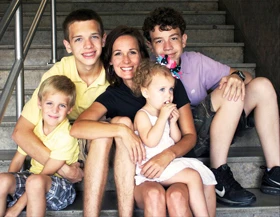
 Monica Abington does things herself. A single mom to four kids and the owner of a Weed Man franchise in Russellville, Ark., she has made her way in the world mostly by sheer force of will.
Monica Abington does things herself. A single mom to four kids and the owner of a Weed Man franchise in Russellville, Ark., she has made her way in the world mostly by sheer force of will.
But then, just before Christmas two years ago, she started to get headaches. Bad ones that wouldn’t stop. When the doctors told her she had a tumor the size of a ping pong ball on her brain, she started to worry.
But her team – senior technician Eric Shatford and office manager Shelley Meyer – and the support of her family, friends and clients kept her going when she was in the hospital and through her recovery.
As told to Chuck Bowen
I apparently was having seizures at night. I’m here alone, so I wasn’t aware of that. I had taken my nanny, who at that time was almost full-time in the house, and the kids on a business trip. So we were all in a hotel room, and she said I began to cough. The following morning I woke up to her sitting on the side of my bed, and she said, “Are you okay?”
Of course, you don’t remember, so I was waking up every day going, “Wow, I really don’t feel that good, but there’s a lot of stress. I’m by myself, and I have these kids, and I’m running the company,” you know. Just chalk it up to what anybody would.
You would never go, “I have a brain tumor.”
So a few more days rocked on, and I woke up with a headache that was not from this Earth, and I called my mom, and of course she rushed over, and off we go to the hospital. They gave me CT scan and this ER doctor walks in, and just like I’m talking to you, goes, “Ms. Abington. Really sorry to tell you this. You have a brain tumor. Where do you wanna go? We can’t help you here.”
And at that moment, they put me in an ambulance, and off we went to UAMS (The University of Arkansas Medical Center). It was horrifying. It was a Lifetime movie that went really wrong.
The tumor had gotten big enough to where it was sitting on a motor nerve and speech nerve, and I was having all kinds of problems, seizures and I was in bad shape and, obviously, in a lot of pain.
So when I woke up, I was in intensive care at UAMS. And at that point, it just became neurologists and neurosurgeons, and not a whole lot of people could be in the room with me.
Every time I’d wake up, I’d ask, “Where are the kids? What are they doing? How’s it shaking down?” And it was the turning point for me personally. It came to a time where I said, “Mom, I need you to go take care of the kids. I don’t need you here with me. I need to know they’re okay.” And so I’m there by myself in the hospital.
I stayed four or five days in intensive care. They were trying to get the seizures under control. They were trying to buy me a little bit of time to prepare.
 Abington with her four children, Caleb, Luke, Abel and Eden. Abington with her four children, Caleb, Luke, Abel and Eden. |
My first phone call when I’m coming home is to my attorney. Put everything in a trust. Make sure that I have a living will. Those were my first thoughts, to provision for my kids, make sure everything legally was tidy. Get the business in the trust, house in the trust.
I was back and forth into the hospital two or three times, and the last time they’d brought in the big-gun surgeon, and he says, “It’s time to operate.” I was on that hospital bed, fully dressed. I was ready to go home. This 85-year-old surgeon, he comes in and he says, “Monica, let’s visit for a minute.”
He wanted to go over what I had going on: single mom, kids, business, all that. And he says, “You are strong and you’re positive, and you’re going to go home, and I’m going to give you two weeks, and you get yourself together. You stay positive, and you don’t look on the Internet, and you don’t read books.”
I kept saying, “Do the surgery. I’m going to be fine. Just take the tumor out, and we’ll go from there.”
And he agreed, and he said, “Go get yourself together, and I’ll see you in two weeks.”
I wrote out the schedule: 6:30, 7:00, 7:30, 8:00, 8:30, 9:00, what everybody did, and it went through every day of the week. Everybody gets to pick one thing they’re involved in because I can’t juggle more than that, so like swim team, cross country, baseball, T-ball; when the nanny was going to be here, when somebody was going to be here to relieve her, who was spending the night, who was taking the weekends.
Because it wasn’t just go, surgery and come home. It was go, surgery and come home with three to six months of constant care, meaning somebody was going to have to live here with me, ’cause I couldn’t pick up my baby and even get her out of her baby bed or change her.
The doctors said some people are forever paralyzed after surgery; some can’t speak.
My kids and Weed Man saved my life. I knew I was within family in both.
I would talk really openly with my family or my kids, and I spoke very candidly. We sat on the floor Indian-style. “I have a brain tumor. It’s right here, and here’s a picture of it on the MRI. The reality is, am I going to die? One day. Am I going to die from this? I don’t know. We’re going to believe God, whatever His plan is, that it’s good.”
And I let them ask me everything, especially my older ones. The little ones it was more like, “There’s going to be a boo-boo right here.” It was more practical. “I can’t pick you up. I can’t play baseball with you.”
Of course, my older ones that know, they just are like, “All right, you’re going to die.” And I just talked to them like I’m talking to you. But in a protective sort of way. “We are going to be OK either way. You are in a good place, and we are going to be OK either way this goes. This is going to be a process. We’re going to walk out of it. This is going to be a year that makes or breaks us, and it’s going to make us.”
 Abington, pictured with her core team of office manager Shelley Meyer and senior technician Eric Shatford, won Weed Man’s People Weedy Award at the company’s 2011 national conference. Abington, pictured with her core team of office manager Shelley Meyer and senior technician Eric Shatford, won Weed Man’s People Weedy Award at the company’s 2011 national conference. |
It was on my right side, so it was affecting everything on my left side. I’m not as coordinated still, but I’m just a year out, and every day you gain a little bit more. They cut on my right side from the hairline on the front in a half-moon to my ear – the skull and the whole thing – and got in there, and then six or seven layers, sew it all up, and off you go, minus one brain tumor.
I came out of surgery paralyzed on my left side. I refused therapy and all the stuff, and they moved me right out of recovery and I went to a normal room, and I said, “I wanna go home, I wanna go home, I wanna go home, and I’ll be fine when I get there.” And in two days I was home, and I guess within a week, by laptop, I was running Weed Man from command center, i.e., my bedroom. [Laughs]
So we were doing morning meetings on my king-sized bed, and then it was just a recovery process from there. It was obviously slow. I couldn’t lift more than a coffee cup, and I had this one-year-old at that time.
Everybody’d bring their cup of coffee. I looked terrible, gigantic bags, I tell you, like a mummy. My head had this big white wrap – I looked very scary. We would put do-rags on for the little kids to come in so they couldn’t see it. It was bloody. It was terrible.
So the Weed Man people would come up, and the first thing out of my office manager’s mouth, she goes, “Eric hurt my finger. I think he broke it.” And I started laughing. I’m like, “Well, I’m glad everything’s back to normal. I mean, you’re just like two little kids.” And he said, “Well, Shelley took my keys, and I didn’t find ‘em.”
Of course, there was some emotion there. Once we kinda got the business taken care of, there were tears. We laughed a lot; we cried a lot.
I had to grab a hold of it and wrangle it down and find a way to manage it. I am finding a way to manage it. I just have to take anti-seizure medicines probably forever and ever, amen, which is fine. I have CT scans every three months.
And I have to pace myself very differently because of that, but there are no restrictions on me as far as what I lift, what I do, how I go, how much I go.
And you know what? I hate that it took a brain tumor to get there, but what a blessing for me to have to establish a more appropriate pace. To ask: What really has to happen, and what would be really fun if it happened?
I’m much more reliant on the team process, and I’m having to know my limitations and draw more healthy boundaries as far as time. And the things that used to be worth arguing about just aren’t.
I learned to graciously say, “Thank you so much. You don’t know how much this has helped.” To say, “I can’t run this route. You’re going to pick up this one.” I can’t be all things to all people. I have to see what makes the cut and what doesn’t and, maybe more importantly, not feel guilty about what doesn’t make the cut.
But the difference is you quickly recalibrate. I went there for a while, no doubt. I got mad, mad at God, mad at everything.
But you come through it, and I decided somewhere in there, “This thing’s going to take me down in flames, if not physically, but emotionally, and so I’m going to make some really distinct choices. I’m going to be thankful. I’m going to stay positive. I am going to be grateful.”
Get curated news on YOUR industry.
Enter your email to receive our newsletters.
Explore the April 2012 Issue
Check out more from this issue and find your next story to read.
Latest from Lawn & Landscape
- Connect, Control & Conserve with Horizon Technical Services
- Use Horizon's Parts Hotline
- How I built a Top 100 company
- Horizon’s Exclusive TurfGro Fertilizer
- Grow your business with mosquito control
- LandCare adds 2 branches in SoCal, promotes Aleman to branch manager
- Spray them away
- PERC helps debut propane direct-injection fuel system at ACT Expo 2025






